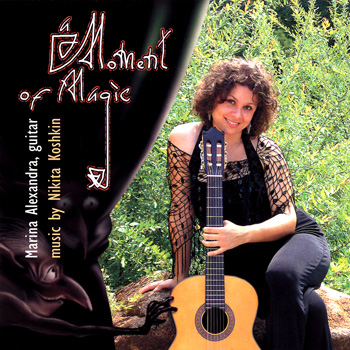 |
|
Romance (1992) Koshkin composed this piece after receiving a challenge from a colleague at the Russian Academy of Music who jokingly said that Koshkin's music could not compete with the famous Spanish Romance in E Minor. The two made a friendly wager on whether or not Koshkin could create such a work in one week. Koshkin won the bet, not only by completing the piece on time but also by creating one of his most lyrical works. Even though Koshkin parodied the anonymous Spanish Romance, he still was able to create an original work and give it a new and distinctive flavor.
Tristan Playing the Lute (1983) was inspired by the mythical character from "Tristan and Isolde." Of this work, Koshkin says, "Tristan was written as a musical joke. It was a period when I was fond of all the stories about King Arthur and his Knights of the Round Table. Tristan was not only a great fighter, but also played many musical instruments and had a beautiful singing voice. This is why I thought he could be the subject of a piece to suggest the process of improvising in a characteristic early style that then begins to change to futuristic musical ideas. The first section of the piece is clearly ancient in style; the second is more modern; then the third introduces elements of Eastern music as well as some rock riffs. The idea is that Tristan, during his improvising, is building musical bridges to the future." [Note 1]
The Ballads (1998) is a collection of five pieces that are represented as a Suite for Solo Guitar. The work is devoted to Russian guitarist Vadim Kouznetov. According to the composer: "I have always felt that the guitar could express itself in many various styles while still remaining a classic instrument. That is why I enjoy turning from one style to another, achieving diversity within my own approach to the instrument. In recent years I have collected impressions from folk and popular music. The Ballads are a reflection of all those impressions, supported by the experiences of my youth when I was a rock guitarist. Notwithstanding the popular style in which it is written, I consider this work to be one of my very best." [Note 2]
Andante Quasi Passacaglia and Toccata: "The Fall of Birds" (1978)
This piece marks an important milestone in Nikita Koshkin's career by being performed for the world premiere of his music in London. Koshkin, who was then only twenty-two and not yet confident about his composing capabilities, had shown some of his music to Vladimir Mikulka while the famous Czech guitarist was on tour in Russia. Mikulka became especially intrigued by one of Koshkin's virtuosic pieces entitled "Toccata," but he also realized that it was too short to be programmed just by itself. Therefore, he decided to list it as "Andante and Toccata," but then forgot until just two weeks before the scheduled concert to ask Koshkin to actually write the new "Andante"! Koshkin worked frantically day and night for two days to finish the work so that Mikulka would have time to learn it before the concert date.
Later, Koshkin recalled that he had dreamed about his piece being announced from the stage as "The Fall of Birds." According to the composer: "When the piece was ready, I was thinking what name to give to it? What title to choose? Then I thought: My God, that dream was not accident! That was sort of an announcement. For me kind of warning that it will happen. So then I put 'The Fall of Birds.' And later, in Apocalypse, I saw written: '- and the birds will fall on earth -'" [Note 3]
The Elves (1984). This suite represents a collection of five short pieces. Each has a contrasting character, which reflects the diversity of Elves' personality. Koshkin says of this work: "Those mystical creatures can be lovely and angry, friendly and frightening, funny and ugly. A merrily stumbling Gavotta begins the cycle, followed by an easy flying Valse and extremely lyrical Melody. The final Gallop, with its dark grotesque and relentless rhythmic pulse, is as I imagine an elves' party to be." [Note 4]
Three Stations on One Road (1979) and Parade (1983) represent proof of Koshkin's eclectic compositional abilities. He is equally brilliant in creating works that challenge his listeners, such as The Fall of Birds and Usher Waltz, while at the same time creating other compositions that are entertaining and accessible to the everyday listener as well. His Three Stations on One Road is built upon a standard "rhythm and blues" chord progression, while Parade shows the influence of American jazz in the style of Gershwin.
Usher Waltz (1984) is one of Koshkin's most popular, and most performed, pieces. It is a programmatic work inspired by Edgar Allan Poe's famous short story, The Fall of the House of Usher, which Koshkin had first read at the age of twelve. Twenty-eight years later, he came back to the story with the idea of writing a waltz following traditions established by the great Russian composers Tchaikovsky, Shostakovich and Rachmaninoff. According to Koshkin, his choice of genre and form for this piece was inspired by the scene in which the story's main character, Roderick, improvises a waltz on a theme of Weber. One can hear a clear parallel between Poe's storyline and the development of Koshkin's music as Roderick sinks ever deeper into madness.
1. Nikita Koshkin, Classic Koshkin: A Collection of Guitar Solos by Nikita Koshkin, ed. Frank Koonce (Pacific, MO: Mel Bay Pub., 2003), 3.
2. Koshkin, from the program notes of Koshkin's second CD recording, The Well Tempered Koshkin (Soundset Recordings, SR 1015), 2000.
3. Koshkin, from a video taped interview by Cain Budds (Arizona State University: January 15, 2000). Provided by Frank Koonce.
4. Koshkin, The Well Tempered Koshkin, Ibid.
Tristan Playing the Lute (1983) was inspired by the mythical character from "Tristan and Isolde." Of this work, Koshkin says, "Tristan was written as a musical joke. It was a period when I was fond of all the stories about King Arthur and his Knights of the Round Table. Tristan was not only a great fighter, but also played many musical instruments and had a beautiful singing voice. This is why I thought he could be the subject of a piece to suggest the process of improvising in a characteristic early style that then begins to change to futuristic musical ideas. The first section of the piece is clearly ancient in style; the second is more modern; then the third introduces elements of Eastern music as well as some rock riffs. The idea is that Tristan, during his improvising, is building musical bridges to the future." [Note 1]
The Ballads (1998) is a collection of five pieces that are represented as a Suite for Solo Guitar. The work is devoted to Russian guitarist Vadim Kouznetov. According to the composer: "I have always felt that the guitar could express itself in many various styles while still remaining a classic instrument. That is why I enjoy turning from one style to another, achieving diversity within my own approach to the instrument. In recent years I have collected impressions from folk and popular music. The Ballads are a reflection of all those impressions, supported by the experiences of my youth when I was a rock guitarist. Notwithstanding the popular style in which it is written, I consider this work to be one of my very best." [Note 2]
Andante Quasi Passacaglia and Toccata: "The Fall of Birds" (1978)
This piece marks an important milestone in Nikita Koshkin's career by being performed for the world premiere of his music in London. Koshkin, who was then only twenty-two and not yet confident about his composing capabilities, had shown some of his music to Vladimir Mikulka while the famous Czech guitarist was on tour in Russia. Mikulka became especially intrigued by one of Koshkin's virtuosic pieces entitled "Toccata," but he also realized that it was too short to be programmed just by itself. Therefore, he decided to list it as "Andante and Toccata," but then forgot until just two weeks before the scheduled concert to ask Koshkin to actually write the new "Andante"! Koshkin worked frantically day and night for two days to finish the work so that Mikulka would have time to learn it before the concert date.
Later, Koshkin recalled that he had dreamed about his piece being announced from the stage as "The Fall of Birds." According to the composer: "When the piece was ready, I was thinking what name to give to it? What title to choose? Then I thought: My God, that dream was not accident! That was sort of an announcement. For me kind of warning that it will happen. So then I put 'The Fall of Birds.' And later, in Apocalypse, I saw written: '- and the birds will fall on earth -'" [Note 3]
The Elves (1984). This suite represents a collection of five short pieces. Each has a contrasting character, which reflects the diversity of Elves' personality. Koshkin says of this work: "Those mystical creatures can be lovely and angry, friendly and frightening, funny and ugly. A merrily stumbling Gavotta begins the cycle, followed by an easy flying Valse and extremely lyrical Melody. The final Gallop, with its dark grotesque and relentless rhythmic pulse, is as I imagine an elves' party to be." [Note 4]
Three Stations on One Road (1979) and Parade (1983) represent proof of Koshkin's eclectic compositional abilities. He is equally brilliant in creating works that challenge his listeners, such as The Fall of Birds and Usher Waltz, while at the same time creating other compositions that are entertaining and accessible to the everyday listener as well. His Three Stations on One Road is built upon a standard "rhythm and blues" chord progression, while Parade shows the influence of American jazz in the style of Gershwin.
Usher Waltz (1984) is one of Koshkin's most popular, and most performed, pieces. It is a programmatic work inspired by Edgar Allan Poe's famous short story, The Fall of the House of Usher, which Koshkin had first read at the age of twelve. Twenty-eight years later, he came back to the story with the idea of writing a waltz following traditions established by the great Russian composers Tchaikovsky, Shostakovich and Rachmaninoff. According to Koshkin, his choice of genre and form for this piece was inspired by the scene in which the story's main character, Roderick, improvises a waltz on a theme of Weber. One can hear a clear parallel between Poe's storyline and the development of Koshkin's music as Roderick sinks ever deeper into madness.
1. Nikita Koshkin, Classic Koshkin: A Collection of Guitar Solos by Nikita Koshkin, ed. Frank Koonce (Pacific, MO: Mel Bay Pub., 2003), 3.
2. Koshkin, from the program notes of Koshkin's second CD recording, The Well Tempered Koshkin (Soundset Recordings, SR 1015), 2000.
3. Koshkin, from a video taped interview by Cain Budds (Arizona State University: January 15, 2000). Provided by Frank Koonce.
4. Koshkin, The Well Tempered Koshkin, Ibid.


